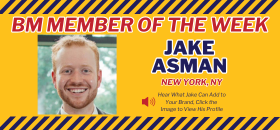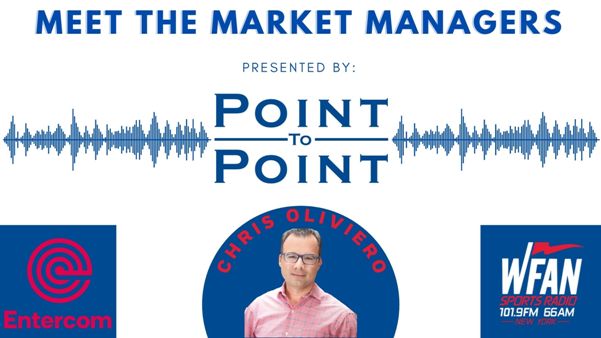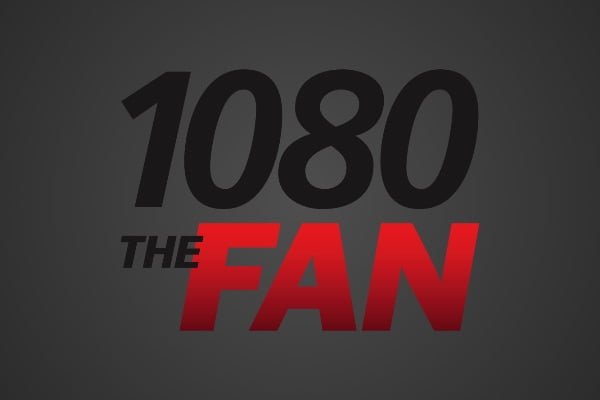Chris Oliviero is a titan in the radio world. I mean, how could he not be? The prestige that comes with being the market manager of Entercom’s New York cluster alone is enough to make the industry listen when you speak. But his history of making big decisions goes back well before May when he took on his current role.
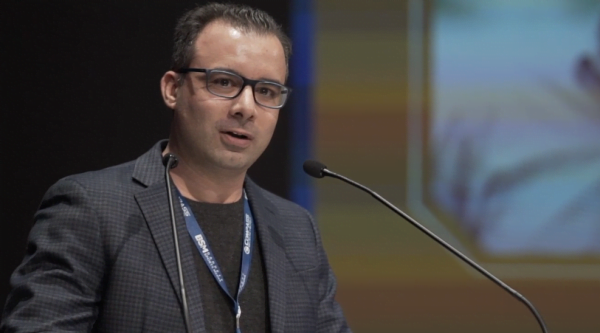
Chris had the professional privilege of spending most of his 22 years with CBS Radio, working with stations in different formats and locations as the company’s head of programming. Under his watchful eye, CBS Radio built and maintained the industry’s best sports audio portfolio, and became the envy of many operators. The company’s results and reputation are what ultimately made it an attractive acquisition target for Entercom.
But one side of the business had an even bigger impact on Chris, negotiating and making deals with hosts and agents. It was the talent relations side of the job that first gave Chris the idea that he might want to have more influence over a cluster’s entire operation. He had a front row seat to Howard Stern exiting CBS for satellite radio. He had the same seat for watching Chris Russo do the same thing. He then saw things from the other side when Jim Rome left Premiere Radio Networks to help launch CBS Sports Radio.
When someone spends over two decades in a competitive industry like radio in a top corporate position, it’s likely they’ll be thrust into the middle of some our industry’s and format’s most high profile upheavals. Chris knew that came with the job, and though it didn’t teach him everything he needed to know about being a market manager, he learned more than enough about every aspect of the business during his time with CBS and Entercom. His lengthy experience as an executive combined with his passion for the business, intelligence, ability to lead, and stellar reputation, are a big reason why Susan Larkin and David Field had faith that he could take the reigns at Entercom New York during the height of a pandemic, and continue leading their brands to success.
In our conversation below, I spoke with Chris about everything from becoming a first time market manager during the most abnormal year of our lifetime, the media’s coverage of sports radio’s most iconic brand, and what he is looking for in Mark Chernoff’s successor.
The conversation starts though at the most natural place I could think of. Sure, Chris is an extremely accomplished and talented guy, but he isn’t the only extremely talented and accomplished programmer out there. So why don’t we don’t see more programmers earning opportunities to ascend from PD to market manager?
DEMETRI RAVANOS: Few market managers in our business come through the programming side of the building. You saw firsthand in 2005 how Howard Stern leaving terrestrial radio impacted local stations. The same could happen right now in the News/Talk space following the death of Rush Limbaugh. Having a feel and understanding for programming I think helps in some of these critical situations but yet there are more people in these roles who’ve come thru the sales side. Does that need to change?
CHRIS OLIVIERO: I totally agree. It’s something I’ve always felt passionate about. We are a content business. We are in the entertainment business. So why should people who come up through the content side of the house somehow automatically be disqualified? Which by the way, if you look at it, it almost was like that was the case that hey, the percentage of leadership that came from the sales side was so high, it almost seemed like it was an automatic disqualification, even though there were a handful of great programmers who became leaders like Dan Mason, Scott Herman, but the vast majority were out of the sales side of the house.
I think if you consider where the industry is today, where we live and die with creative content that’s not only compelling to an audience but also to clients, why not have that point of view and perspective? Now, that said, what I’ve always said to my colleagues in programing, if you want to make that leap, you’ve got to be able to balance the show and the business in show business. You can’t you can’t go at these jobs, like market manager, all about the show or all about the business. You’ve got to find that middle ground. Can you marry your creativity with a discipline, a financial responsibility, and with an understanding of a P & L? If you can balance that, I think the more programing people that get into market manager positions, the healthier and better the industry will be.
Obviously, sales leadership, it’s the same thing. Great managers have come out of the sales side. My only point is it should be balanced.
DR: The other example I can think of is Mike Thomas in Chicago. It’s weird to say this about those two markets in particular, but I do wonder if you’ve ever felt like you are under a microscope for the industry as a whole to see if programmers can do the very top job in a building?

CO: I don’t feel that, and I’m very good friends with Mike. I know he doesn’t feel that either, because if you start thinking like that, you’re just going to set yourself up for frustration and disappointment. Just focus on doing the job. And I think in my case in particular, coming from my corporate position for so many years, though, the job title was Head of Programing for CBS Radio, I was lucky enough to be very involved in business and management and P & L’s, so I felt like I was coming from an experience that was more than just programing and content, which sets me up, I think, hopefully for success in this job, knock on wood.
DR: You took over as Entercom New York’s market manager in May 2020 when we were at the height of the pandemic and many people didn’t know what to expect day to day. How were you able to provide leadership and make sure everyone was on the same page and understood your vision during a time when no one was in the building?
CO: Still to this day, most people are not (in the building). I have stressed to our team, and I firmly believe this, if I didn’t have a history with the company, Entercom and then obviously before that CBS Radio, and knew a vast majority of the people and clearly was familiar with the New York properties immensely, as a joke I say ‘if I didn’t know where the bathroom was located’, I don’t think I could have started this job in the midst of working from home, virtually, during the pandemic. I think it might have been overwhelming and I would have been in the fetal position.
It was the fact that I went in with a base already. I knew the company shorthand. I knew where the third rails were. I think it gave me the ability to, at minimum, hit the ground running as opposed to having to take time to kind of learn the cadence of the operation. So I think that was a huge advantage selfishly for me.
DR: So let’s talk about your history in the building, because in addition to your run with CBS Radio, you did spend time with Entercom after the merger and then chose to leave. What changed either in your life or at the company that you were willing and ready to come back when the job was offered?
CO: After the merger happened, I was very upfront with people close to me, including the leadership of Entercom. I think I was itching for a little bit of a break. You know, we just went through the sale process on the CBS side. That was a very emotionally and physically draining process, preparing a company for either a potential IPO, spin off, a merger, all these various scenarios that could have played out.
So that was really a personal decision. That wasn’t a decision like, ‘oh, I’m done with radio’. That wasn’t the decision. It wasn’t like, ‘oh, I don’t want to work for Entercom’. It was more of a personal decision where I felt like “Hey, you know what? I think I’m going to put a nice stamp on this chapter. It feels like closure. It feels like a really good time to put a period at the end of that sentence and say it’s time to move on.” And that’s that’s what I did. It was very amicable, very friendly, which you know, clearly if it wasn’t, I don’t think I would have wanted to come back nor would they have asked me to.
So during the year and a half or two years after I left, I stayed in very close contact with the people at Entercom personally and professionally. And then when this opportunity presented itself, as you said in the midst of the pandemic, I wasn’t looking for it. It just kind of presented itself. Susan Larkin was kind enough to reach out and explain the opportunity. I just paused and I was like “huh, this might be something for a next chapter”, because to your point, it’s very different than my first job.
This was a chance to get back to a local market. This was broadening, the core responsibilities beyond programing, and doing it at a place that I just have a passion for. People who know me know my two passions are radio and New York City. This job combines those two passions.
I think it’s the best job in local broadcasting anywhere in the country when you think about the assets in the cluster. So I said, let’s jump into it. And again, I was looking for a challenge and let’s be honest, local radio in the midst of a pandemic? Yes, it’s going to classify a challenge.
DR: So I’m going to need you to answer or I guess settle a running joke/debate between JB and I. So the BSM summit was in New York three months before you were announced in your new position. I have jokingly told Jason that Susan Larkin owes him a finder’s fee. Did the conversations begin backstage at the BSM summit? JB doesn’t think they did.
CO: No, they did not. So you owe Jason whatever you wagered. Please pay your debt.
It started a few weeks after that. Actually, the date was the final day you were allowed to have indoor dining in New York City. So that was like mid-March. I had lunch with Susan and that’s kind of where it came up. So it did not happen at the Summit.
DR: So we can’t put that on the poster for next year, then?
CO: You cannot put that on the poster. That would be a lie.

DR: So as you look at Entercom as a whole, podcasts are obviously very popular. It’s a space the company believes in and it’s continuing to gain popularity. In New York, you have local and network radio brands. There’s also a digital network with Radio.com Sports. I wonder as you think about all those assets where sports talk is happening within your building, where you think most people immediately associate sports talk these days?
CO: Immediately, I still believe it’s terrestrial broadcast radio. Without a doubt, especially when you go market by market. If you were in New York and you said to somebody on the street “sports radio”, I think unaided, they’re going to say FAN. If you go to Boston, they’re going to say EEI or the Sports Hub. Chicago The Score, WIP in Philly.
So clearly, I still think radio is that first initial reaction but again, you’ve got to define radio differently. Someone might consume WFAN exclusively as a digital product now, streaming on Radio.com or time shifted podcasts. So when we say FAN, we don’t necessarily assume it’s AM or FM at that point. So, shifting the definition of FAN from a radio station to a brand, but the brand is still, I think, the most influential local sports media brand.
DR: I do look at Entercom and their sports presence around the country, and notice that there have been major investments made in sports betting content. Do you see that as not just a strong part of the future of sports audio, but could it be the future of sports audio?
CO: I think it’s a part of the future of sports audio, but I don’t think it is the entirety of it. We have to think about it. Is there still a significant portion of the population that doesn’t wager on sports? I think it’s important for all of us in the sports media business to balance that approach, not make assumptions, and serve both audiences.
So how do you serve the audience that does not bet on sports, but then also serve the audience that does? Then you have to break it down even further – the section of the audience that casually bets on sports vs. the subsection of that audience who are daily players and view it like the stock market. I think that’s the secret sauce. That’s where all these additional platforms come in where you’re able now to bifurcate your programing and serve everybody what they want, as opposed to 10, 15, 20 years ago where you just had one platform and you’re like, “OK, I have to make a choice. I could do gambling, non gambling, baseball, football.” Where now you could say “I’ve got the FM, the AM, the stream, the podcast, social channels.” There’s enough shelf space now in terms of platforms, to serve the appetite of every sports fan. So I don’t take it as like you have to choose one or the other anymore.
DR: Since you returned to the building, WFAN has seen a number of changes to the roster. Whether it was Mike Francesa re-retiring, Joe Benigno retiring or Craig Carton returning, does that mean that WFAN has gotten an outsized amount of your attention compared to other stations in your building?
CO: You sound like all my colleagues at the other stations, because they do remind me of that.
DR: I will defend myself and say mine was a genuine question.
CO: OK, so yes. I might move my office because I realized just by the nature of where the office is located, it is in the FAN section of the building. I might move to another part of the building to lessen that perception, but you’re right. And everybody understands that.
It’s a very complicated operation, and right now, there’s been significant change that requires additional focus. To me as a manager, it all ebbs and flows. Once we get on the other side of this hill, maybe 1010 WINS or country or CBS FM will get more attention. It’ll just ebb and flow in terms of the needs.
The good thing about it, and if you were to ask me what’s the most important thing a market manager needs to be successful at it’s that they need great managers for each department. If I’m pulled in one direction, let’s say FAN right now, I know I’ve got great sales leadership across the board. I’ve got great engineering support. I’ve got great brand managers across the other properties. So if you’ve got the right people, it allows a manager to move from fire to fire.
DR: I read around the time that Mark Chernoff announced he was retiring this spring that you were looking for a sort of brand executive instead of a traditional PD, somebody that could really think about what WFAN is going forward. And I wonder, what is the WFAN brand right now in 2021 in your eyes?
CO: I’ll answer that in a second, but I just want to clarify that what I said at that time was I am “open to that”. It doesn’t mean I’m going to disqualify what some would say is a traditional radio brand manager, but I’m just saying that because we have the benefit of the time and because Mark’s not going anywhere immediately, why not take advantage of that time and look broadly and then figure out where the process naturally takes us? If it takes us back internally, great. If it takes us externally, that’s great, too.

So in terms of where the state of the FAN brand is, I think for a brand that is now 30 plus years old, that started in a traditional broadcast medium like radio, it’s still so compelling, so strong. And again, I repeat this a lot. I will win this argument. It is the most influential sports media property in New York City, more influential than any newspaper, more influential than any local television station, more influential than any other radio station, local digital asset or regional sports network. FAN is synonymous with New York sports in a way no competitor is regardless of momentary hype. That hasn’t changed in 2021. It’s the same way it was in 1991, 2001, and 2011. So the brand is strong. It’s just different and it’s different because platforms are different. Also, the talent is evolving and different. But the brand at its core is still the most influential in the market.
DR: Are people inside the building already letting you know who or what they want to see in the next PD at WFAN?
CO: Yes, absolutely and I seek that out! I reach out to people and say, “Hey, give me your point of view. Give me your perspective.”
The good thing about “inside the building,” and this is a testament to Entercom’s strength in the format, I broadly define “inside the building” as inside the company. If you think about all the sports radio properties that Entercom has around the country, those are also internal conversations. So, be it a PD in another market who might express interest, that’s a blessing in the process. Clearly, from a format standpoint, I guess dominate is a fair word to say for the Entercom footprint for sports radio, so the candidate list internally is a who’s who. And again, that’s something I’m going to take advantage of, meaning there’s no rush.
DR: I hadn’t thought about the idea of “inside the building” and “inside the company” being the same in your eyes. That makes a lot of sense for the approach.
CO: It’s got to be, because if you think of my history and my previous life at CBS Radio I was so intrinsically involved with every sports station around the country, those that we’ve launched from scratch that didn’t exist before we put them on the air or those heritage brands that we continue to evolve. So, again selfishly, that’s an advantage I think that I can rely on from my previous life.
DR: Is familiarity with the legacy of WFAN going to be as important as a vision for its future?
CO: Yes, because here’s why. When you have a brand that is this successful and has truly stood the test of time, you’ve probably heard this a thousand times, but you want evolution. You don’t want revolution. That brand equity is extremely valuable. You don’t want to move too quickly in a disrespectful way to the past. You want to recognize the past. You want to honor the past, use that as the foundation for the future, but this is not a revolution. There’s just no need for it. I mean, it is an extremely healthy business today. It’s just about beginning the transition to a future state.
DR: As you look at the new afternoon show, I think it is clear most listeners are happy to hear Craig on the air again. I think fans of those guys are liking what they hear. But the media in New York is so focused on how it’s going to go, how does it sound compared to Joe and Evan or Mike Francesa, how does it stack up with Michael Kay. I wonder how hard is it to grow a new show and a new partnership under the kind of microscope that comes with WFAN and on top of that, the kind of microscope that comes with Craig Carton?
CO: Not hard at all, actually. We welcome it. Think about it. FAN has been around the block. We have thick skin at FAN. We don’t crumble under scrutiny. And then when you talk about the talent, Craig and Evan, both total pros. They’ve been doing this a long time. They don’t shy away from the pressure, so we actually enjoy it. We enjoy the attention.
We talked about it earlier. How many, “local radio stations” get the exorbitant amount of attention of every minutia move that they make like FAN does? It doesn’t exist anywhere else.
I say to people all the time, it’s like the media covers sports in New York where they cover the teams and then FAN. FAN has become almost like a pro sports team. And the line up at FAN is almost judged and scrutinized like the Yankees batting line up. And we love that. We welcome it, because that is a recognition of the station’s stature. When people stop paying attention or people stop covering us, that’s when I’d get really nervous. And also to remember too, any programmer would tell you this, you don’t program to the media reaction. You program to the listener and to the fans. That’s what we do. That’s what Craig and Evan do.
Their show is basically four months old, but even less than that if you consider the holidays and vacation times. After only three months, I couldn’t be happier with where the show is. It’s getting an enormous amount of attention. The symbiotic relationship between all the shows has never been stronger. If you think about how Boomer & Gio interact with the afternoon show now, how the afternoon show interacts with Moose and Maggie in mid days. That has not always been the case in the history of FAN. That’s good for business, where all three of the shows during the day are kind of swimming together.
DR: You mentioned that the time is going to come where the spotlight shifts to, whether it’s CBS or 1010 WINS. I do wonder with those two stations, in addition to FAN, if there have been conversations about people’s listening habits changing in New York due to Rush passing away. Has there been sort of a “time to step up what we’re doing” discussion given the reality that new listeners will likely be available due to their favorite show no longer being available?
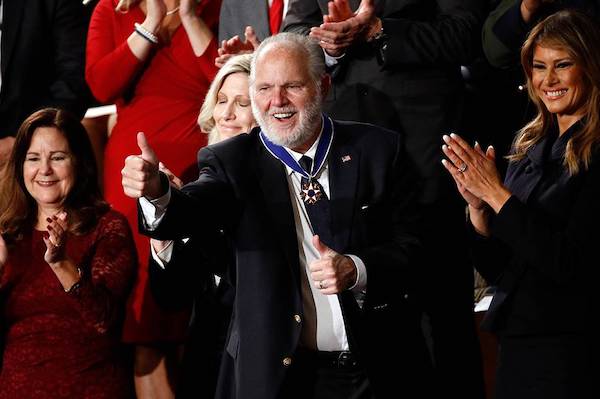
CO: Yeah, I think definitely from a company perspective. But the key for us in New York is we’re in the all news business in New York. We’re not in the news talk business. So if you look at 1010 WINS and CBS 880, they’re all news all the time. They’re not news talk stations per se. That lane in New York is more the OR, WABC lane, but to your point, Rush was such a dominant personality, not just nationwide, but he did tremendously well in New York City. I know that shocks people because you think of New York City, you think of a liberal Democratic stronghold. But Rush performed extremely well for decades on WABC and even recently on WOR.
So now will there be an opportunity where a portion of the population between noon and 3 Monday through Friday in New York City are sniffing around for other audio options? I’m sure there will be. But are we going to change what 1010 and 880 do? No. Our position is going to be ‘if you stumble upon us, and you’re a post-Rush listener, you’re going to like what you hear’. But it’s an all news presentation. So if you’re still looking for news talk, well, you’ll probably go somewhere else and that’s ok.

Demetri Ravanos is a columnist and features writer for Barrett Media. He is also the creator of The Sports Podcast Festival, and a previous host on the Chewing Clock and Media Noise podcasts. He occasionally fills in on stations across the Carolinas in addition to hosting Panthers and College Football podcasts. His radio resume includes stops at WAVH and WZEW in Mobile, AL, WBPT in Birmingham, AL and WBBB, WPTK and WDNC in Raleigh, NC.
You can find him on Twitter @DemetriRavanos or reach him by email at DemetriTheGreek@gmail.com.




